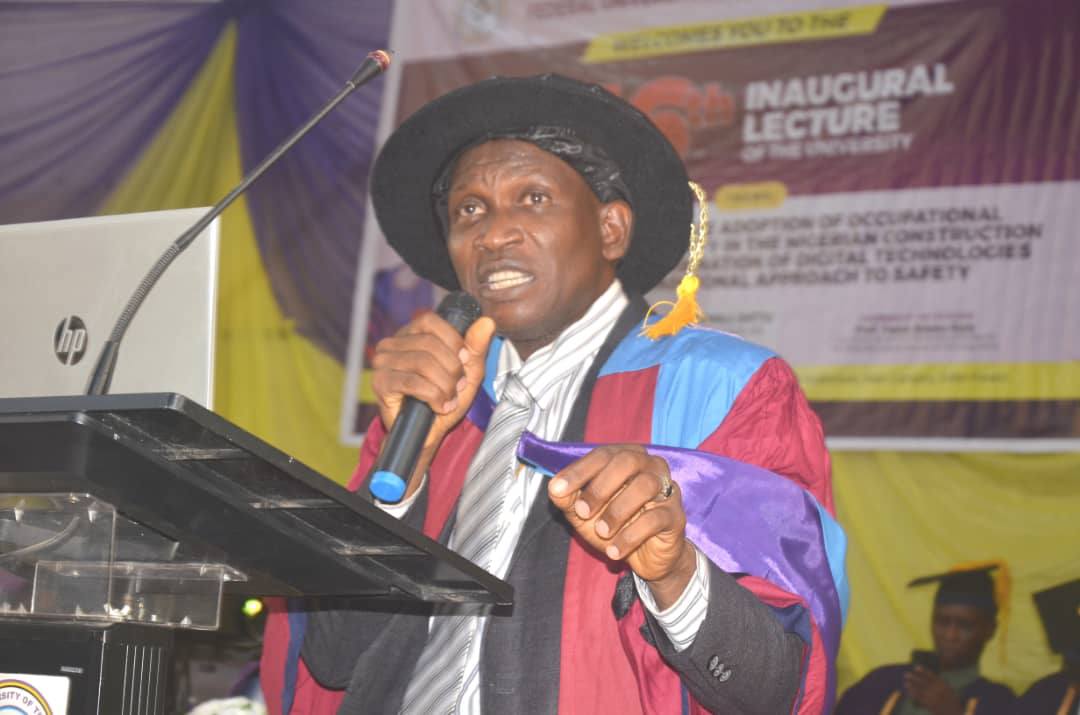QS. Prof. Abdullateef Adewale Shittu has emphasized the urgent need for a more robust safety culture in Nigeria’s construction industry by combining traditional health and safety practices with modern digital technologies. He made this call while delivering the 116th Inaugural Lecture of the Federal University of Technology, Minna (FUT Minna) on Thursday, 31st July 2025, at the University Auditorium, Main Campus.
The lecture, titled “Enhancing the Adoption of Occupational Health and Safety in the Nigerian Construction Industry: Combination of Digital Technologies and Traditional Approach to Safety”, underscored the critical role of construction in meeting fundamental human needs shelter, in particular and the associated risks that demand comprehensive safety management.
Prof. Shittu, a Professor of Quantity Surveying in the Department of Quantity Surveying, highlighted that construction sites remain one of the most hazardous work environments, frequently experiencing accidents and fatalities. He stressed that addressing these risks requires a multi dimensional approach that integrates human behavior with technological and environmental controls.
“Safety is not one dimensional. It involves behavior, planning, training, and the physical environment. A hybrid model that merges traditional safety principles with cutting edge digital tools is essential to achieving zero harm,” he said.
He identified key traditional safety practices management commitment, worker involvement, communication, planning, and training as foundational. Complementing these, he noted, are emerging technologies such as Building Information Modelling (BIM), Artificial Intelligence (AI), Virtual Reality (VR), drones, wearable tech, and site monitoring sensors, all of which are revolutionizing hazard identification, worker training, and compliance globally.
Despite these advances, Prof. Shittu pointed out several challenges limiting their adoption in Nigeria. These include erratic power supply, high implementation costs, weak regulatory enforcement, political interference, and limited safety awareness particularly among small and medium-sized construction firms.
Citing research conducted on local construction SMEs, he observed a worrying trend of low safety compliance despite the availability of protective gear, largely due to poor safety culture, low literacy levels, and inadequate training.
To bridge these gaps, Prof. Shittu proposed a flexible, cost effective hybrid safety model tailored for the Nigerian context. The model integrates traditional safety management with scalable digital innovations and is adaptable for SMEs and other sectors of the economy.
He called for interdisciplinary collaboration among stakeholders engineers, health professionals, technologists, and policymakers to drive a cultural shift toward safety consciousness. He also encouraged further research focused on embedding safety behaviors into digital systems for more effective implementation.
“Safety is a shared responsibility. Cultivating the right mindset, supported by smart tools and strong leadership, will create safer workspaces and significantly reduce accident rates in our construction sites,” he concluded.
In his remarks, the Vice-Chancellor of FUT Minna, Prof. Faruk Adamu Kuta, commended QS. Prof. Shittu for delivering an insightful and timely lecture that offers practical solutions to longstanding safety challenges in Nigeria’s construction industry.
Prof. Kuta noted that the proposed model provides a viable roadmap for protecting lives, promoting safety compliance, and fostering a safety-first culture in the sector.

